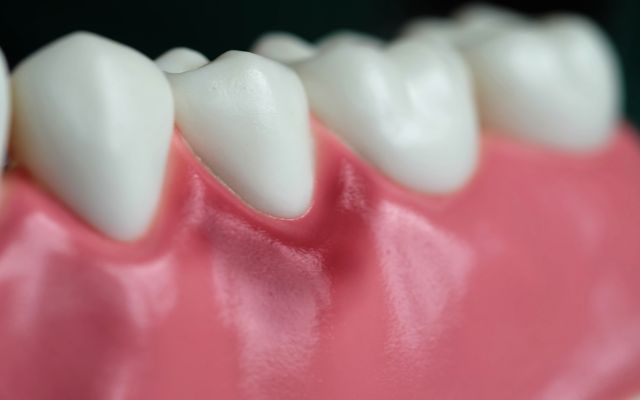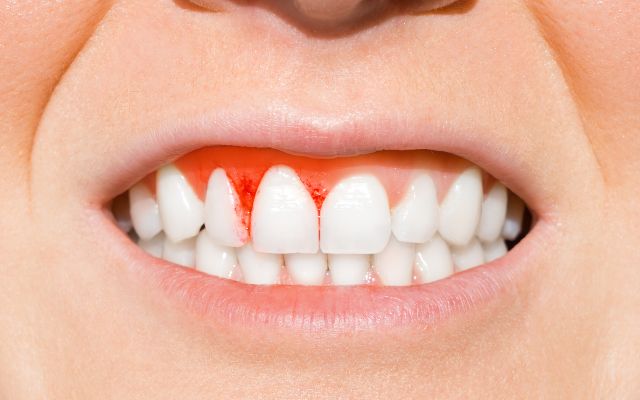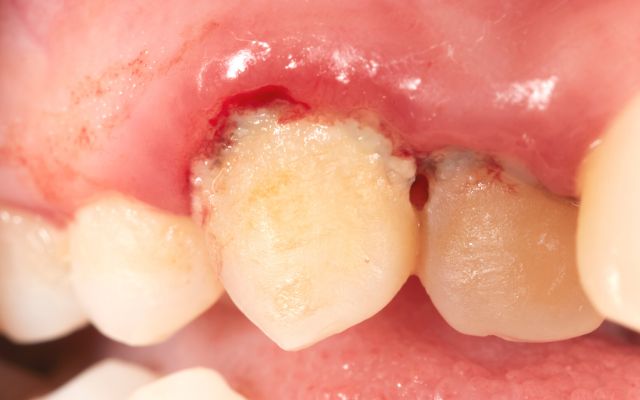Gingivitis: is a sort of gum disease that normally causes moderate symptoms and affects the majority of adults. We will provide some information about causes, and signals as well as guides to treat it in this article.
Let’s get started!


Overview of Gingivitis
Gingivitis is a frequent and moderate form of gum disease (periodontal disease) that causes irritation, redness, and swelling (inflammation) of the gingiva, the area of the gum that encircles the tooth’s base.
It is crucial to take gingivitis seriously and to treat it swiftly. Gingivitis can develop to the far more severe periodontal disease periodontitis and tooth loss: gingival tissue, dry mouth, gingivitis symptoms, severe form, plaque-induced gingivitis, plaque buildup, gum infection, oral care, attachment loss, periodontal diseases.
Inadequate oral hygiene is the leading cause of gingivitis. Good oral hygiene practices, such as brushing at least twice per day, flossing daily, and receiving regular dental exams, can help prevent and reverse gingivitis.
Important aspects of gingivitis include:
- The accumulation of bacteria around the teeth is the most prevalent cause of gingivitis.
- Gingivitis is characterized by red, swollen gums that may bleed when a person brushes their teeth.
- Good oral hygiene, such as longer and more frequent brushing and regular flossing, can frequently cure gingivitis. Additionally, an antimicrobial mouthwash may be beneficial.


Symptoms of Gingivitis
Healthy gums are firm, pale pink, and closely adhered to the teeth. The following are signs and symptoms of gingivitis:
- Swollen or swollen gums
- Dusky crimson or dark red gums
- Having gums that bleed easily when brushing or flossing
- Halitosis Receding gums
- Tender gums
When to get dental care: Schedule an appointment with your dentist if you observe any indications or symptoms of gingivitis. The sooner you get treatment for gingivitis, the greater your prospects of reversing its damage and preventing its advancement to periodontitis.
Some reasons for Gingivitis


Poor dental hygiene is the most prevalent cause of gingivitis because it promotes the formation of plaque on the teeth, resulting in inflammation of the surrounding gum tissues. How plaque can contribute to gingivitis:
- Plaque develops on the teeth. Plaque is an invisible, sticky film consisting primarily of bacteria that forms on teeth when starches and sugars in meals interact with the regular oral bacteria. Plaque requires daily eradication since it re-forms quickly.
- Plaque transforms into tartar. Plaque that remains on the teeth can harden under the gumline into tartar (calculus), a bacterial breeding ground. Tartar makes it more difficult to eliminate plaque, provides bacteria with a protective barrier, and irritates the gumline. To remove tartar, a professional dental cleaning is required.
- Gingiva becomes irritated (gingivitis). The longer plaque and tartar remain on teeth, the more they irritate the gingiva, the tissue surrounding the tooth roots, producing irritation. Over time, your gums grow inflamed and readily bleed. Moreover, tooth decay (dental caries) may ensue. Gingivitis can lead to periodontitis and eventual tooth loss if left untreated.
Risk factors
Gingivitis is a common condition that can affect anyone. The following factors can raise your risk of gingivitis:
- Poor oral care habits
- Chewing or smoking tobacco
- Older age
- Dryness of the mouth
- Malnutrition, particularly a lack of vitamin C
- Dental restorations that do not fit properly or teeth that are crooked and difficult to clean are undesirable.
- Leukemia, HIV/AIDS, and cancer treatment are conditions that reduce immunity.
- Certain medications, such as phenytoin (Dilantin, Phenytek) for epileptic seizures and several calcium channel blockers used to treat angina, excessive blood pressure, and other disorders, can increase the risk of heart attack.
- Changes in hormones, such as those associated with pregnancy, menstruation, or the use of birth control tablets
- Genetics
- Illnesses including various viral and fungal diseases
Complications of Gingivitis
Untreated gingivitis can advance to periodontitis, a far more serious condition that can result in tooth loss.
It is believed that chronic gingival inflammation is linked to systemic disorders such as respiratory disease, diabetes, coronary artery disease, stroke, and rheumatoid arthritis.
Some study indicates that periodontitis-causing bacteria can enter the bloodstream through the gum tissue, potentially damaging the heart, lungs, and other organs. But additional research is required to confirm a link.
Trench mouth, also known as necrotizing ulcerative gingivitis (NUG), is a severe form of gingivitis characterized by ulcerations and painful, inflamed, bleeding gums.
Trench mouth is uncommon in developed nations, but prevalent in poorer nations with poor diets and living circumstances.
Gingivitis Treatment Guide
To treat gingivitis, proper oral hygiene must be practiced. You should also quit smoking if you are a smoker and control your diabetes if you are diabetic. Quitting smoking may be challenging, but a doctor can help you develop an effective quitting strategy.
Other treatments include:
- Cleaning your teeth thoroughly
- Antibiotic pharmaceuticals.
- Surgery.
Brushing teeth
There are various non-surgical methods for performing a deep cleaning of the teeth. They all eliminate plaque and tartar to avoid gum inflammation:
- Scaling. Scaling the teeth eliminates tartar from above and below the gum line.
- Root planing. This eliminates tartar and plaque from the root surface and smoothes rough places.
- Lasers. This procedure may be less painful and bleed less than root planing and scaling.
Medications
Several drugs are available for the treatment of gum disease:
- To disinfect the mouth, a mouthwash containing chlorhexidine can be used.
- After root planing, antiseptic chips containing chlorhexidine can be put into pockets.
- After scaling and planing, antibiotic microspheres containing minocycline can be placed into pockets.
- Antibiotics taken orally can be used to treat persistent gum inflammation.
- Antibiotic Doxycycline can prevent enzymes from causing tooth damage.
Surgery
Surgery may be required if your gingivitis is severe, especially if it has caused gum or bone tissue loss. Periodontists conduct the following varieties of gum surgery:
- Flap operation. The gums are retracted during flap surgery, while plaque and tartar are removed from deeper areas. The gums are then sutured around the tooth to provide a secure fit.
- Tissue and bone transplants. When your teeth and jaw are too damaged to recover, grafting can be used.
- During gum graft surgery, tissue from the palate is used to cover the exposed tooth root. This helps prevent further bone and gum loss.
- For a bone graft, your physician will begin with a procedure similar to flap surgery, but they will insert a bone graft to encourage the regeneration of any missing jaw bone.
- Dental crown elongation. Certain individuals with gingivitis may have excessive gum tissue. A periodontist can then remodel your gum and bone tissue to expose more of your teeth if this is the case. This may also be required prior to certain aesthetic or restorative dental operations.
Prevention for Gingivitis
Good oral hygiene
This involves cleaning your teeth for two minutes at least twice daily, in the morning and before bed, and flossing at least once daily. Better still, brush after every meal and snack, or as recommended by your dentist. Before brushing, flossing assists you to remove loose food particles and microorganisms.
Regular dental appointments
Visit your dentist or dental hygienist every six to twelve months for cleanings. If you have risk factors that enhance your likelihood of developing periodontitis, such as dry mouth, certain medications, or smoking, you may require more frequent professional cleanings. Annual dental X-rays can aid in the detection of problems that cannot be detected by a visual examination and can be used to track changes in your dental health.
Excellent health practices
In addition to a nutritious diet and managing blood sugar if you have diabetes, it is essential to maintain healthy gums by engaging in other healthy behaviors.
Contact Our Dental Clinic
If you are experiencing any dental problems, or have gingivitis but do not know how to properly treat it. You should go directly to Spring Orchid Bassendean dental clinic to be examined and examined by a dentist.
After having accurate examination results, the dentist will come up with a plan that can help save costs and time while ensuring the best results for each patient.
FAQs
Can gingivitis be reversed?
The only stage of gum disease that can be reversed is gingivitis. Most people can recover the health of their gums by working closely with a dentist or periodontist and following their advice for a proper oral care practice. When gum disease is left untreated and allowed to grow, however, irreversible damage occurs to the gums.
How can one avoid gingivitis?
Gingivitis can be avoided by maintaining good dental hygiene. This requires twice-day brushing and daily flossing, or more as directed by your periodontist. Regular professional teeth cleanings and biannual dentist visits are also necessary for maintaining healthy gums and teeth.
What Symptoms Does Gingivitis Cause?
Symptoms of gingivitis, or early gum disease, include red, sensitive gums and bleeding during flossing. You may also experience bleeding after consuming hard or crunchy foods. Your dental hygienist may inform you that you have pockets where your gums attach to your teeth.





